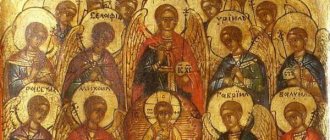Confession and communion (Eucharist, Lord's Supper) are the main sacraments of the Orthodox Church, in which all believers are supposed to take part. Confession of sins is most often held in the evening, after Sunday church services. This ritual also takes place on other days before the start of the morning liturgy. Communion is celebrated on Sundays and on church holidays. Every Christian needs to know when these sacred rites are combined with each other, and in what cases they become independent rituals and can be performed separately.
Why are confession and communion closely interconnected?
The essence of confession is a person’s awareness and acceptance of his sinfulness and spiritual imperfection. It is followed by repentance, which must be sincere and help the Christian in preventing repeated mistakes.
Negative acts are released through the words and actions of the clergyman, who acts as the main earthly witness of this sacrament. A layman who confessed and repented of wrongdoing:
- cleanses your soul from evil;
- becomes closer to the Creator;
- receives hope of being heard by the Lord and forgiven by Him.
Communion is considered a bloodless repetition of the sacrifice of Jesus Christ, which he made while on earth in human form. By receiving communion, a person unites with the Savior, rises spiritually, and receives protection from dark forces. Orthodox priests argue that Christians should receive communion as often as possible, from the day of baptism until physical death.
Confession and communion have a single essence and a common goal, which is the forgiveness of human sins and unity with God. These rituals have an inextricable spiritual relationship, and also represent an important custom that has been established throughout the centuries-old existence of Christianity.
Is confession possible without subsequent communion?
Many representatives of the Orthodox Church equate confession with second baptism, since during this rite the internal renewal of a Christian occurs. A person acquires spiritual wings, throws off the burden of accumulated sins, and makes a promise to the Lord to begin a new, worthy life.
In most cases, confession, which can take place from the age of seven, is followed by the ritual of communion. Having cleansed himself and repented of his actions or negative thoughts, the believer can accept the Holy Gifts with peace of mind, that is, receive communion.
At the same time, representatives of the clergy do not exclude holding a confessional ritual as an independent rite. Confession without communion is carried out if a person is bothered by pangs of conscience and he feels the need to quickly repent of a crime he has committed.
To repent of his sins and receive forgiveness, a layman can visit the temple on any day of the week. In this case, you need to first agree on the time with the priest and carry out the correct preparation. It involves a deep analysis of one’s actions, reconciliation with others, reading the canons of repentance, and studying special literature that helps to better understand the essence of the sacred sacrament.
Why is confession always held before communion?
The situation with communion is somewhat different than with the penitential rite. Confession of sins before the Eucharist is obligatory. It is especially important to confess followed by communion on major church holidays and fasts (Easter, Christmas, Lent, Holy Week).
The clergy believe that communion without confession is deprived of its deep meaning and great power. In the absence of repentance, this ritual rather turns into a formality, and therefore is not capable of bringing spiritual fruit to a believer.
Having confessed, a Christian will be able to:
- cleanse your thoughts of everything that is displeasing to God;
- prepare spiritually for participation in the great sacrament of communion.
After the person has repented, the priest makes a decision as to whether he can now receive communion. After confession, recommendations are always given to help you properly prepare for the ritual of communion. For several days (usually no more than two or three) preceding the ceremony, you will need to strengthen your prayer rule and observe fasting. This means refusing to eat certain types of food (animal, hot, spicy) and various entertainments, limiting communication with others and in marital relationships, as well as regularly reading special prayers and attending church services.
Ancient canonical rules
Ancient definitions regarding Christian participation in the Eucharist were very strict, largely due to the small number of communities. According to the 9th Apostolic Canon, everyone who is in the Church and calls himself a Christian, but does not receive communion, “should be excommunicated from church communion.” Similar measures are proposed in the rules of the VI Ecumenical and Sardician Councils, which call for excommunication from the Church of those who have not received communion on more than three Sundays in a row.
According to ancient cathedral decrees, there are a number of restrictions for those wishing to receive communion. So, for example, one who has a grave unrepentant sin or does not repent of it enough, who lives in an illegal marriage, who is not baptized (95th canon of the Trullo and 7th canon of the Laodicean Councils) should not be allowed to receive communion. Also, a ban on communion is prescribed for those bearing penance - that is, punishment for sin for correction, but if this person is in mortal danger - Communion is allowed. Over time, around the 4th century, the tradition of obligatory Eucharistic fasting, that is, complete abstinence from food and drink on the day of Communion until the moment of receiving the Mysteries, became stronger. And later, by the 11th–12th centuries, among Byzantine monasticism, the custom of special multi-day preparation for the Eucharist was established, which included fasting, a prayer rule and frank confession to the confessor. This tradition soon began to spread to the laity, and then passed on to other local Churches. So, for example, it was included in the instructions of the Russian Typikon, where a seven-day fast before communion was indicated as mandatory. However, this often led to the fact that many Christians, due to “inappropriate” preparation, were unable to receive communion for quite a long time.
Are there exceptions that allow communion without confession?
The procedure for conducting the rite of communion is considered quite strict, but sometimes it can be relaxed. This is possible only in extreme cases, if the Christian has a good reason.
Lay people are allowed to approach the sacrament of communion without confession and repentance who:
- they accept bread and wine, which are symbols of the body and blood of the Savior, after a short period of time after the previous sacrament;
- We didn’t have time to confess in church for an objective reason, but we asked God for forgiveness for our sins during fervent home prayer;
- during the period since the previous confession, they led a correct lifestyle and did not commit any negative actions.
There are also circumstances that are beyond the control of believers. For example, if the temple they visit is small and there is only one priest serving in it. In this case, the priest does not always have the opportunity to absolve every layman before communion. In such situations, communion is held without confession.
If a Christian is going to receive communion without prior confession, the priest should always know about this. Under such circumstances, it is imperative to notify the church minister and agree with him on the possibility of performing this sacrament without repentance.
Why do you need to take communion? Should there be special sensations after communion?
After the Jews left slavery in Egypt, the Lord gave the Ten Commandments on Mount Sinai and ordered Moses to build a tabernacle from expensive materials, a kind of portable temple, one of the first schools of piety. “When Moses entered the tabernacle, then the pillar of cloud came down and stood at the entrance of the tabernacle, and [the Lord] spoke to Moses. And all the people saw the pillar of cloud standing at the entrance of the tabernacle; and all the people stood up and worshiped, every one at the door of his tent. And the Lord spoke to Moses face to face, as one speaks to his friend” (Exodus 33:9-11).
This is how the Lord determined the place of His special presence. Later, at the command of God, the wise King Solomon built a majestic stone temple in Jerusalem. The Most Holy Theotokos was brought up in this temple, and then our Lord Jesus Christ Himself entered this temple. Unfortunately, due to the fact that the majority of the Jews did not accept the Savior and crucified Him, the temple, like the entire city, was destroyed during the Jewish uprising in 70. From this temple only part of the wall remains, which is now called the Wailing Wall.
Now, following the example of the Jerusalem Temple, many majestic and beautiful Christian temples have been built all over the world, and we, like the ancient Jews, believe that in them there is a special place of the presence of God. All our Orthodox churches are built on the model of the ancient tabernacle, that is, they consist of three parts: the Holy of Holies - the altar, the main part where the people stand, and the vestibule...
– Father, how does our Orthodox church differ from the Old Testament?
– Perhaps the most significant difference is that in an Orthodox church, unlike the Old Testament, where innocent animals were sacrificed, a bloodless sacrifice is made - the Sacrament of the Holy Eucharist is performed, when simple bread and wine are given through the prayers of the upcoming priest and the people by the power of the grace of the Holy Spirit are transformed into the true Body and Blood of our Lord Jesus Christ. When we approach with faith the communion of the Holy Mysteries of Christ, we are invisibly united with God Himself.
– Many people on a subconscious level are drawn to the temple, feel that the Lord is here, and try to go in and at least light a candle and briefly pray for themselves and their loved ones, but they limit themselves to this. How important is it to also participate in the Sacraments that are performed here?
– If a person came to the temple with tears of repentance and prayer and limited himself to only lighting a candle, then no one has the right to condemn such a person for the fact that he did not stay here for a longer time and did not begin the Sacraments. Perhaps this is his first small experience of joining the spiritual life. Some time will pass, and this person will have a need to deepen his relationship with God.
– But such a need may not appear! It is no secret that today, despite the abundance of necessary information, many people have no idea about the Church Sacraments; no one told them about it either in the family or at school.
– Yes, now most people are baptized in the Orthodox faith, but are not enlightened, that is, they do not have basic knowledge about the faith, and especially about the Church Sacraments. But when a person does not participate in the sacraments of the Church, it is very difficult for him or, it would not be an exaggeration to say, impossible to resist those temptations and temptations into which worldly vanity constantly plunges him.
– For people who live in the world, although they constantly step on the same rake, this is not obvious. Can you give any specific example?
– For example, a person got married. At first everything went well, there was love and harmony, but as we got to know each other more deeply, the marriage began to deteriorate and was on the verge of a complete break. What to do? In most cases, as official statistics testify, such a marriage breaks up, because in a conflict that has flared up, usually each side blames the other side and there is no end to these mutual accusations. If faith in God glimmers at least a little in a person’s heart and he tries to constantly support and ignite it through prayer, confession and the Holy Mysteries of Christ, then in the light of faith he sees the cause of the conflict not in another person, but first of all in himself and tries to do everything, make any sacrifices and concessions, so that the conflict exhausts itself. No one can do this without faith and without participation in the Sacraments. Or let's take another example: someone has a very harsh and picky boss who is not easy to tolerate. And so the constant squabbles and scandals begin. If a person has faith, then he is calm, because he fears not a stern boss, but God, and tries to do everything in the best way, in order to please Him first.
“However, there are many cases when people regularly go to church, confess, take communion, but do not become better or become even worse than they were. Why does this happen?
– Perhaps the main reason for the lack of change is not the ineffectiveness of the Sacraments, but the wrong attitude towards them. Often people, when they begin Communion, are looking for some special sensations and delights. It happens that they even brag to each other about their feelings after receiving the Sacrament, but at the same time they forget about its main essence. The essence of the Sacrament is not to experience delight, but to overcome yourself, your sins and passions with God’s help and become closer to the Lord and other people.
– Should there really be no sensations at all after Communion?
– There can be only one feeling – awareness of one’s unworthiness before God. This is stated in the prayer before Holy Communion: “I believe, Lord, and confess that You are truly the Christ, the Son of the Living God, who came into the world to save sinners, from whom I am the first.” Sometimes, from the feeling of their unworthiness, tears appear in people’s eyes. I know some priests and laity who never receive communion without tears. But the main thing during Communion, I repeat, is not special sensations, but spiritual closeness with the Lord and with other people.
– But can’t Communion have a beneficial effect not only on the soul, but also on a person’s body, and heal him from illnesses?
- Yes, in the prayer before Communion there are the words: “May the communion of the Holy Mysteries of Christ be not for judgment or condemnation, but for the healing of soul and body.” This means that Communion can also grant physical health. It is no coincidence that believers, in case of serious illness and especially before surgery, try to partake of the Holy Mysteries of Christ. There are many cases where the Communion acted beneficially, when doctors had long ago lost all hope.
– Why do believers take communion with one cup and one spoon?
– An essential aspect of Communion is the unity of all people in Christ. In the ancient Christian monument Didache (the teaching of the twelve apostles), the Eucharistic prayer is given, which contains the following words: “As this broken bread was scattered over the hills and, gathered together, became one, so may Thy Church from the ends of the earth be gathered into Thy kingdom, For Yours is the glory and the power through Jesus Christ forever” (9:4). Through Communion, a crowd of people, where everyone worries only for themselves, turns into a Church, where all people become close and dear, ready to perceive other people's pain as their own, other people's joys as their own. And just as in a family everything is common and they often do not disdain to eat from the same utensils, so during Communion we become one great family, and therefore we receive communion from one cup and one spoon.
– How often should you take communion? In the 19th century, according to the Catechism of St. Philaret (Drozdov), the laity were recommended to receive communion 4 times a year, that is, during the Great, Petrov, Dormition and Nativity fasts. And now we see that some people receive communion at every liturgy. How to find the golden mean?
– I think that in the 19th century such a recommendation - to take communion four times a year - was dictated by necessity, due to the impoverishment of faith and piety among part of the intelligentsia and the people. Almost all the pastors of that period testify to this in their sermons and journalistic speeches. At that time, many people completely stopped going to church and receiving communion. Hence the recommendation in the Catechism: better rarely than never. But now the situation is different. Nowadays, we priests recommend that people take communion at least once a month and always on the twelve feasts. For those who want to receive communion more often, for example, seminary students, novices, monks, or people who go to church more than once a week and try to lead an active spiritual life, we do not prohibit this. On the contrary, it is joyful that in our time there are still people who, first of all, try not to please themselves, not their bliss, relaxation and passions, but God.
– Nowadays people travel a lot and end up in places where there are no Orthodox churches. Can they receive communion in a Catholic or schismatic church?
“It’s better not to do this, because although these religious meetings preserve ancient rituals, they have lost their essence. This is a topic for a separate big conversation. The worst thing is that they fell away from the one Holy Catholic and Apostolic Church, which we as a whole church confess at every service in the Creed. And a branch on a tree that has broken off can only retain its beautiful greenery and fragrance for the time being, but later, without moisture, it dries out completely.










